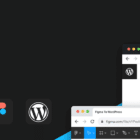Last week Automattic published a video titled “A meditation on the open web” that calls out Facebook as the antithesis of the open web:
As you get closer the air gets smoggier and you realize it’s a vast metropolis. It’s surrounded by high concrete walls, completely contained. Inside it’s bustling, lots of honking traffic, people everywhere, the sound is deafening. You see people arguing in bars and chatting on street corners. Billboards and advertisements are everywhere, touting ever kind of good and service. It’s noisy and dense and overwhelming.
This is Facebook.
The video also likens Instagram to a cookie cutter housing development that is actually just a collection of billboards with no one living there.
My expectation before playing the video was that it would enumerate the positive aspects of the open web but I was surprised to find it juxtaposed with Facebook and Instagram in a somewhat jarring fashion midway through. It effectively communicates the stark contrast between the limitations and restrictions of social media silos and the freedom of owning your own website.
[youtube https://www.youtube.com/watch?v=pB5gaJloeRU?version=3&rel=1&fs=1&autohide=2&showsearch=0&showinfo=1&iv_load_policy=1&wmode=transparent&w=627&h=353]
Open Web Meditation was created as a design experiment at Automattic that encourages viewers to look beyond the walls of dominant social media platforms and consider how our experiences on the web differ based on where we choose to share our ideas. The company is looking to gain global exposure for the video by inviting people to create their own versions of it in their own languages.
Automattic’s video is a timely message, as the world pauses to reflect on the 30th birthday of the World Wide Web this week. In his open letter published by the Web Foundation, Tim Berners-Lee urged companies, governments, and the web’s citizens not to give up on building a better web. He identified “system design that creates perverse incentives,” where user value is sacrificed, as one of the most dangerous threats to the web at this time.
“You can’t just blame one government, one social network or the human spirit,” Berners-Lee said. “Simplistic narratives risk exhausting our energy as we chase the symptoms of these problems instead of focusing on their root causes. To get this right, we will need to come together as a global web community.”
Many commercial entities have enjoyed extraordinary and unprecedented opportunities and influence because of the creation of the world wide web. Berners-Lee underscored their responsibility toward the public as stewards of the open web.
“Companies must do more to ensure their pursuit of short-term profit is not at the expense of human rights, democracy, scientific fact or public safety,” he said. “Platforms and products must be designed with privacy, diversity and security in mind. This year, we’ve seen a number of tech employees stand up and demand better business practices. We need to encourage that spirit.”
In an interview with the BBC, Berners-Lee said that global action is required tackle the web’s “downward plunge to a dysfunctional future.” This 30-year anniversary is a good time to re-examine our complex relationships with centralized services and return to the guiding principles that have made the web a universal, open place of opportunity.




